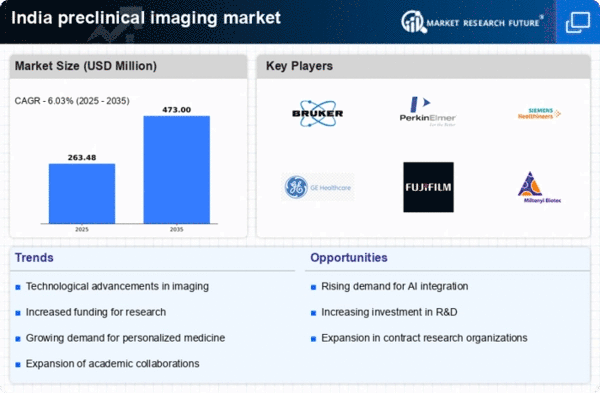Government Initiatives and Support
The Indian government is actively promoting the preclinical imaging market through various initiatives aimed at enhancing research capabilities. Programs that provide funding and resources for research institutions are becoming more prevalent, thereby facilitating advancements in imaging technologies. The Department of Biotechnology and the Indian Council of Medical Research have launched schemes to support innovative research projects, which often include preclinical imaging components. This governmental backing is expected to bolster the market, as it encourages collaboration between academia and industry. Furthermore, the allocation of approximately $200 million for biotechnology research in the recent budget indicates a strong commitment to fostering growth in this sector, which is likely to benefit the preclinical imaging market significantly.
Growth in Biopharmaceutical Research
The rapid growth of the biopharmaceutical sector in India is positively impacting the preclinical imaging market. As more biopharmaceutical companies emerge, the need for advanced imaging techniques to evaluate drug efficacy and safety becomes increasingly critical. The market for biopharmaceuticals is projected to reach $50 billion by 2025, with a substantial portion of this investment directed towards preclinical studies. This trend suggests that the demand for imaging technologies, such as optical imaging and ultrasound, will rise correspondingly. The integration of imaging modalities in biopharmaceutical research not only enhances the understanding of drug mechanisms but also accelerates the development process, thereby driving the preclinical imaging market forward.
Rising Demand for Non-Invasive Techniques
The preclinical imaging market in India is experiencing a significant increase in demand for non-invasive imaging techniques. Researchers and pharmaceutical companies are increasingly recognizing the advantages of non-invasive methods, which allow for real-time monitoring of biological processes without the need for surgical interventions. This trend is particularly relevant in the context of drug development, where understanding the pharmacokinetics and pharmacodynamics of new compounds is crucial. The market for non-invasive imaging modalities, such as MRI and PET, is expected to grow at a CAGR of approximately 10% over the next five years. This growth is driven by the need for more efficient and ethical research practices, as well as the increasing complexity of disease models that require advanced imaging solutions.
Emergence of Advanced Imaging Technologies
The preclinical imaging market is being significantly influenced by the emergence of advanced imaging technologies. Innovations such as hybrid imaging systems, which combine modalities like PET/CT and SPECT/MRI, are gaining traction among researchers in India. These technologies offer enhanced resolution and sensitivity, allowing for more accurate assessments of biological processes. The increasing adoption of these advanced systems is expected to propel the market, as they provide comprehensive insights into disease mechanisms and treatment responses. Furthermore, the market for these advanced imaging technologies is anticipated to grow at a CAGR of around 12% over the next few years, reflecting the ongoing demand for improved imaging solutions in preclinical research.
Collaboration Between Academia and Industry
Collaboration between academic institutions and industry players is becoming a pivotal driver for the preclinical imaging market in India. Such partnerships facilitate the exchange of knowledge and resources, leading to the development of innovative imaging solutions tailored to specific research needs. Universities are increasingly partnering with biotech firms to leverage their expertise in imaging technologies, which enhances the overall research landscape. This collaborative approach is likely to result in the introduction of novel imaging techniques and applications, thereby expanding the market. The establishment of research consortia and joint ventures is expected to foster a more integrated ecosystem, ultimately benefiting the preclinical imaging market by accelerating the pace of innovation and application.
















